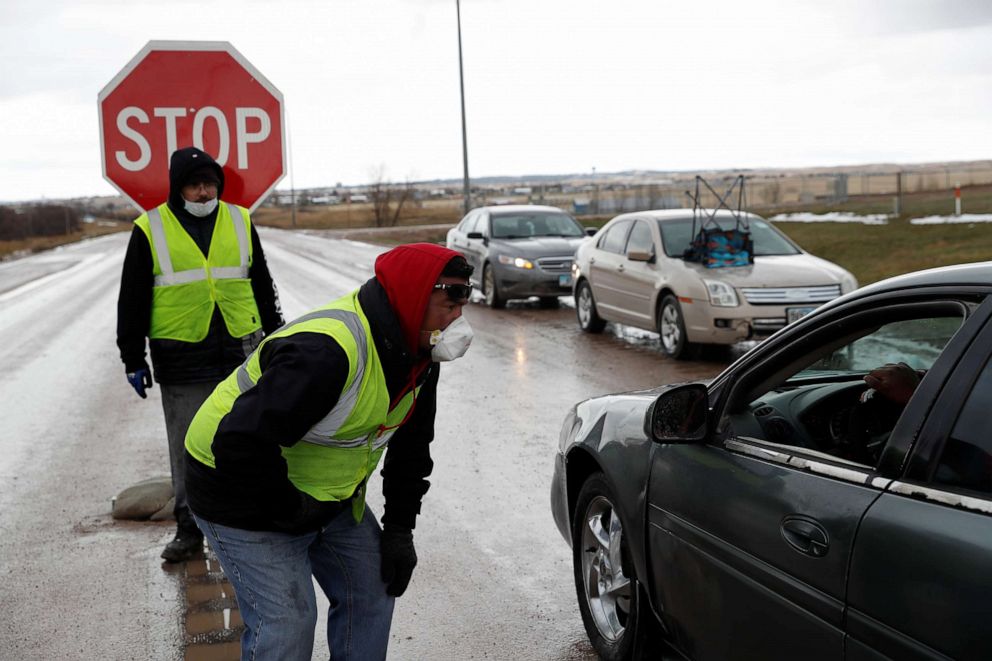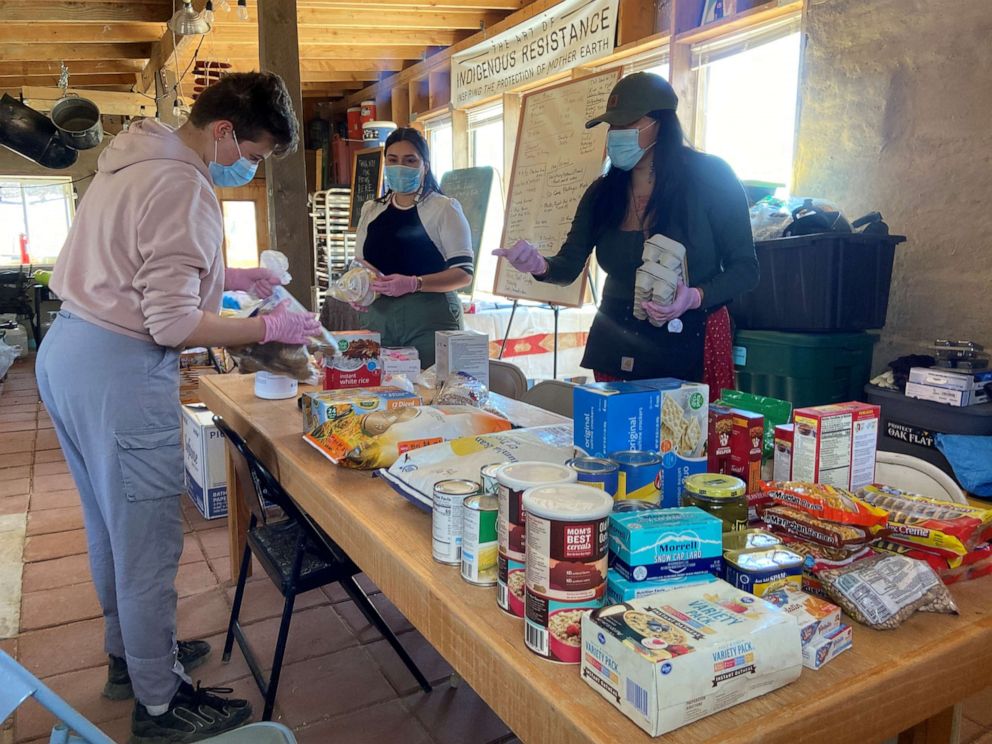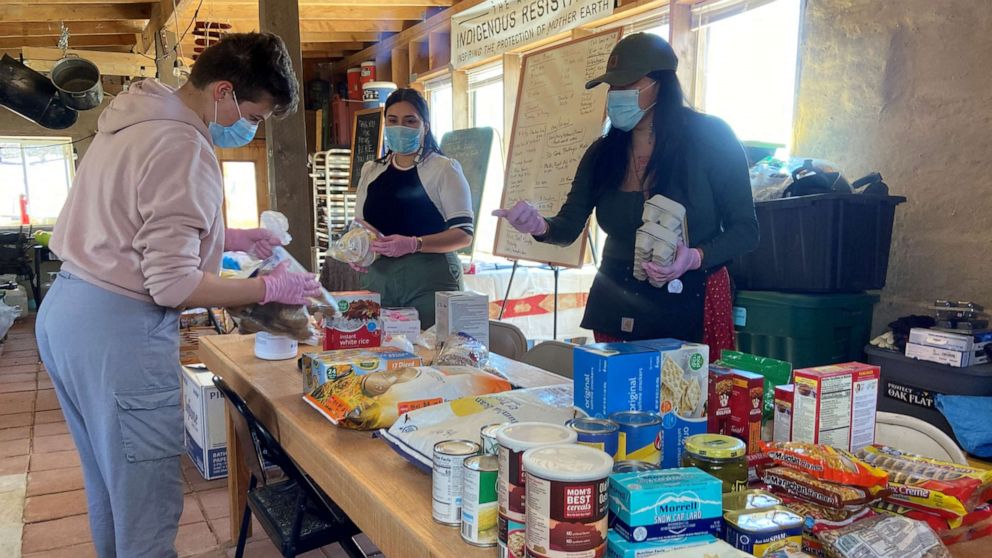Tribes will begin to see some of coronavirus relief money owed by federal government
Native American tribes were expected to see some long-awaited relief money from the federal government trickle in as soon as Tuesday, according to the Treasury Department -- but the battle is long from over with no timetable set for the remaining funds and a court fight over some of that cash potentially going to for-profit corporations.
The nearly 600 federally recognized tribes in the U.S. have not yet received any of the $8 billion set aside for tribes in the CARES Act, which passed over a month ago, despite the devastation Native American tribes have disproportionately experienced from coronavirus.
Navajo Nation, for example, the nation's second-largest tribe, has the third-highest rate of infection in the country, behind New York and New Jersey. Cases in the Navajo population made up 55% of total cases in New Mexico as of Monday.
On Tuesday, Treasury Secretary Steve Mnuchin said $4.8 billion, or 60% of the total $8 billion initially set aside, will begin hitting tribes' bank accounts. The money will be distributed based on population size, with the largest tribes receiving the biggest shares of money.
Tribes had expected to receive the full funds by April 24 and now there is no timetable for the remaining money, some of which could go, controversially, to the for-profit Alaska Native Corporations. More than a dozen tribes have sued to try to stop the corporations, which serve tribal shareholders in Alaska, from getting the relief money, arguing that it should go directly to Alaska Native tribes. A judge recently sided with the tribes, temporarily halting the Treasury Department from disbursing money to Alaska Native Corporations, but the Treasury Department still intends to do so.
The delay in relief has "outraged" tribal leaders across the country, said Chuck Hoskin Jr., the principal chief of the Cherokee Nation, in an interview.
The Cherokee tribe, the largest in the country and home of the largest tribal health system, said the relief was desperately needed. That they're receiving some of it is encouraging, though "long, long overdue," Hoskin said.

The government will "have to do more than commit to a belated plan to distribute some of the funds" in order to restore relationships, Hoskin said. "They need to develop a plan to distribute all the funds."
"Once they do that, they can start to repair some of the injury that's been inflicted on Indian Country during a time when we are on the front lines of public health, when we have experienced crippling effects to our own region's economies, and in which we need to share in the recovery," he said.
Democratic New Mexico Sen. Tom Udall, whose state is home to 23 Native American tribes, called the Treasury's announcement on Tuesday "the definition of 'too little, too late.'"
"It comes weeks after the deadline and billions of dollars short," Udall said in a statement.
Still, some tribes are optimistic.
"Although the formula for distribution was unknown until today, we are very pleased that many Tribal Governments will begin receiving a portion of much needed financial relief based on population data, hopefully by the end of this week, to help provide critical services to their citizens," said Matthew Wesaw, Tribal Council chairman of the Pokagon Band of Potawatomi, a tribe in Michigan and Indiana.
As for the other 40% of the funds, which amounts to $3.2 billion, the Treasury Department has yet to say when it will be disbursed.The money will be distributed based on how many employees are on tribes' payrolls, according to guidance from the Treasury Department.
That relief would particularly benefit tribes that have small populations but employ thousands of people through tribal businesses, like gaming, though all tribes stand to benefit from the money in different proportions.
The concern, though, is that pending litigation could take a chunk out of the outstanding money.

An undisclosed amount has been withheld for Alaska Native Corporations until the court case is resolved, according to the Treasury Department, and the money could theoretically come out of the 40% of funds that haven't been distributed yet.
"That's the discouraging part of today's news," Hoskin said.
Hoskin said that while the Alaska corporate interests are entitled to relief, they should seek other avenues.
"They certainly deserve relief, but the 573 federally recognized tribal governments should get exactly what the Congress intended, which is an appropriate share among those tribes of the $8 billion," Hoskin said.
Because there are over 200 Alaska Native Corporations, one concern is that including them would dilute the pot of relief money. Tribes have also pushed back against qualifying Alaska Native Corporations as federally recognized tribes, arguing that money to the for-profit corporations doesn't directly benefit Alaska Native tribes in the same way a direct payment would.
"Alaska Native tribes that I've talked to are saying to leave the Alaska Native Corporations out and let the tribes directly benefit. There's no need for an intermediary for them to benefit," said Chairman Aaron Payment, 1st Vice President of the National Congress of American Indians, in an interview.
In court, lawyers for Alaska Native Corporations argued that the corporations are sympathetic to the desire to protect tribal members, but "the Alaska Natives that comprise and are serviced by the ANCs are no less deserving of relief." Without relief funds, Alaska Native Corporations "risk disproportionally bearing the brunt of this already-devastating pandemic," according to court documents filed Tuesday morning.
Mike Williams Sr. is a tribal leader in the Alaska Native village of Akiak and a shareholder of two corporations. He believes the corporations should get relief funds, but federally recognized tribes deserve the "entirety of the $8 billion funding from the CARES Act," he said.
"Corporations are hurting too but because of their classification, they can access relief funds from other venues," Williams said in an interview. "We have to take care of our employees and so there should be a bailout for us like airlines and other businesses. But we fully support the tribes."
ABC News' James Hill contributed to this report.




